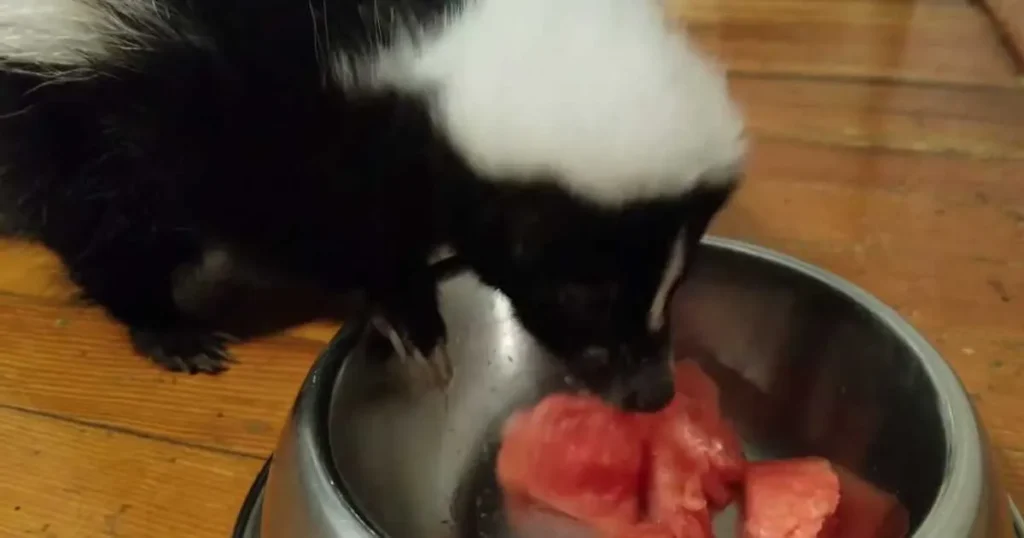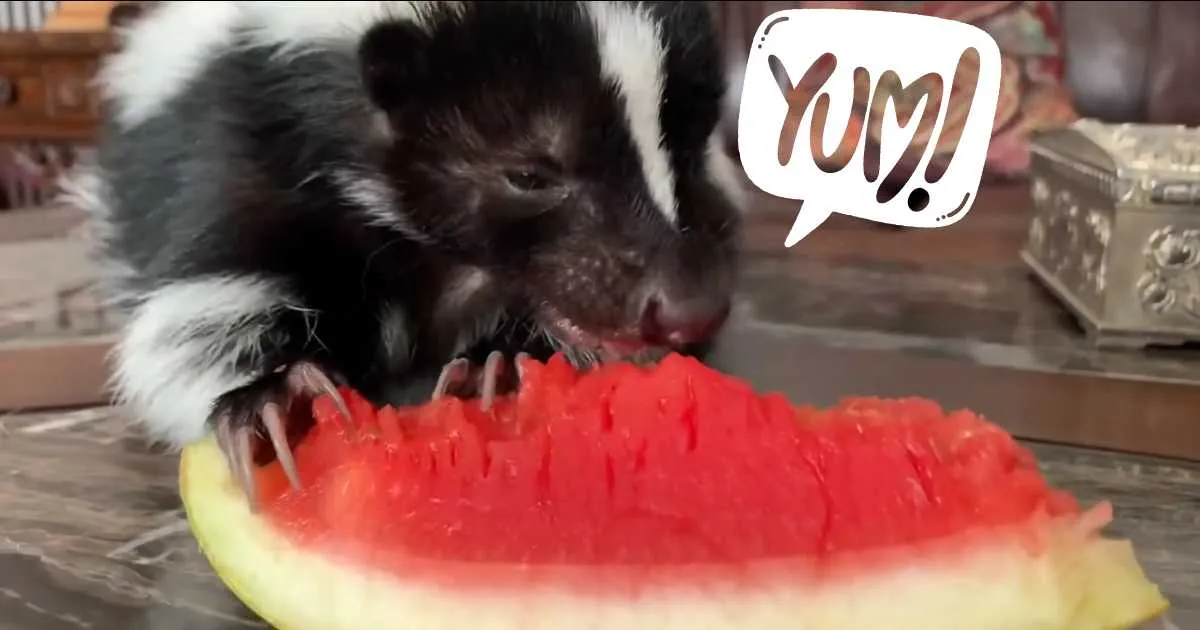Do Skunks Eat Watermelon? Learn More
Last updated on December 8th, 2024 at 01:08 am
As a skunk owner and wildlife enthusiast, understanding the dietary preferences of these fascinating creatures is essential. Skunks are renowned for their distinctive black-and-white fur and their potent defensive spray, but their eating habits are equally intriguing. One common question that arises is: Do skunks eat watermelon? The answer is yes, skunks do enjoy watermelon, and it can be a nutritious addition to their diet when offered appropriately.
In this comprehensive guide, we’ll explore skunks’ affinity for watermelon, the nutritional benefits, how to safely offer watermelon to skunks, and the role watermelon plays in their overall diet. Whether you’re caring for a pet skunk or observing skunks in the wild, this guide will help you better understand and cater to their dietary needs.
Understanding Skunks’ Diet
Skunks are omnivores, meaning they consume both plant and animal matter. Their adaptable diet allows them to thrive in various environments, from woodlands to urban areas. Skunks are opportunistic feeders, which means they eat whatever is available and easy to obtain. Here’s a closer look at their typical diet:
Primary Food Sources
- Insects and Larvae: Beetles, crickets, grubs, and caterpillars.
- Small Mammals: Mice, voles, and occasionally rabbits.
- Fruits and Berries: Apples, berries, melons, and other seasonal fruits.
- Reptiles and Amphibians: Frogs, lizards, and occasionally small snakes.
- Birds’ Eggs and Nestlings: Particularly from ground-nesting birds.
- Vegetation: Leaves, roots, and grasses.
- Carrion: Dead animals and leftovers from other predators’ kills.
Watermelon fits into the fruits and berries category, offering skunks a sweet and hydrating treat, especially during warmer months.
Do Skunks Eat Watermelon?
Yes, Skunks Do Eat Watermelon
Watermelon is a favorite among many skunks due to its high water content, natural sweetness, and easy accessibility. Skunks are particularly drawn to ripe, juicy watermelon slices that are left out in gardens or during picnics.
Why Skunks Love Watermelon
- Hydration: Watermelon is composed of about 90% water, helping skunks stay hydrated, especially during hot weather.
- Natural Sugars: The sweetness of watermelon provides a quick energy boost.
- Ease of Consumption: Soft and juicy, watermelon is easy for skunks to eat without much effort.
- Nutritional Value: Watermelon is rich in vitamins and minerals that contribute to a skunk’s overall health.

Nutritional Benefits of Watermelon for Skunks
Watermelon offers several nutritional benefits that make it a healthy treat for skunks:
Key Nutrients in Watermelon
- Vitamins:
- Vitamin A: Supports eye health and immune function.
- Vitamin C: Acts as an antioxidant and supports skin health.
- Minerals:
- Potassium: Maintains proper muscle and nerve function.
- Magnesium: Important for bone health and enzyme function.
- Hydration: High water content helps keep skunks hydrated.
- Antioxidants: Compounds like lycopene help protect cells from damage.
Health Benefits
- Supports Immune System: Vitamins A and C boost the immune system.
- Promotes Hydration: Essential for maintaining bodily functions, especially in warmer climates.
- Aids Digestion: The fiber in watermelon helps regulate digestion and prevent constipation.
How to Safely Offer Watermelon to Skunks
If you decide to include watermelon in your pet skunk’s diet or want to offer it to wild skunks, it’s important to do so safely and responsibly.
For Pet Skunks
- Choose Fresh Watermelon: Ensure the watermelon is ripe and free from mold or pesticides.
- Remove Seeds and Rind: While skunks can eat the flesh, seeds and rind can be difficult to digest and may cause choking hazards.
- Cut Into Small Pieces: Make it easier for your skunk to eat and reduce the risk of choking.
- Moderation is Key: Watermelon should be an occasional treat, making up no more than 10-15% of their diet to maintain a balanced nutritional intake.
For Wild Skunks
- Offer Sparingly: While watermelon can attract skunks, overfeeding can lead to dependency on human-provided food sources.
- Avoid Feeding at Night: Skunks are nocturnal, but feeding them can disrupt their natural foraging behaviors.
- Use Safe Portions: Provide small slices or chunks to prevent overeating and waste.
Tips for Both Pet and Wild Skunks
- Avoid Added Sugars and Flavors: Plain watermelon is best. Do not offer watermelon with added sugars, salts, or other flavorings.
- Monitor Consumption: Keep an eye on how much and how often skunks consume watermelon to ensure it complements their overall diet.
Watermelon as Part of a Balanced Skunk Diet
While watermelon is a nutritious treat, it should not replace the primary components of a skunk’s diet. A balanced diet for skunks includes:
Protein Sources
- Insects: Beetles, crickets, and larvae.
- Small Mammals: Mice, voles, and rabbits.
- Eggs: From ground-nesting birds.
Fruits and Vegetables
- Fruits: Berries, apples, and melons like watermelon.
- Vegetables: Carrots, sweet potatoes, and leafy greens.
Additional Foods
- Reptiles and Amphibians: Frogs, lizards, and small snakes.
- Carrion: Scavenged meat from dead animals.
Watermelon should complement these foods, providing variety and additional nutrients without dominating the diet.
The Role of Fruits in a Skunk’s Ecosystem
Fruits like watermelon play a significant role in the ecosystem by supporting skunks’ nutritional needs and aiding in seed dispersal. Here’s how:
Seed Dispersal
When skunks consume fruits, they often excrete the seeds in different locations. This helps in the propagation of various plant species, contributing to biodiversity and the health of the environment.
Pest Control
Skunks control insect and rodent populations by feeding on them, indirectly benefiting plant life and reducing crop damage.
Nutrient Cycling
By consuming a variety of foods, including fruits, skunks contribute to nutrient cycling within ecosystems, helping maintain soil fertility and plant growth.
Conclusion
Do skunks eat watermelon? Absolutely! Watermelon is a delightful and nutritious treat for skunks, providing essential vitamins, minerals, and hydration. Whether you’re caring for a pet skunk or observing these creatures in the wild, offering watermelon can be a great way to supplement their diet. However, it’s crucial to provide watermelon in moderation and as part of a balanced diet that includes protein-rich foods, other fruits, and vegetables.
By understanding and catering to skunks’ dietary preferences, we can ensure their health and well-being while also appreciating their role in maintaining ecological balance. Remember to always prioritize safety by removing seeds and rind, avoiding added sugars, and monitoring their overall intake. With thoughtful feeding practices, you can coexist peacefully with these adaptable and beneficial animals.
Frequently Asked Questions
Skunks enjoy a variety of foods, but their favorite fruit tends to be berries, particularly the wild ones they find in their habitat.
Skunks should avoid chocolate, caffeine, alcohol, and onions, as these foods can be toxic to them. Avoid giving them anything containing these substances.
Feed wild skunks small amounts of fruits, vegetables, and cooked grains. Avoid processed foods and always offer water.

